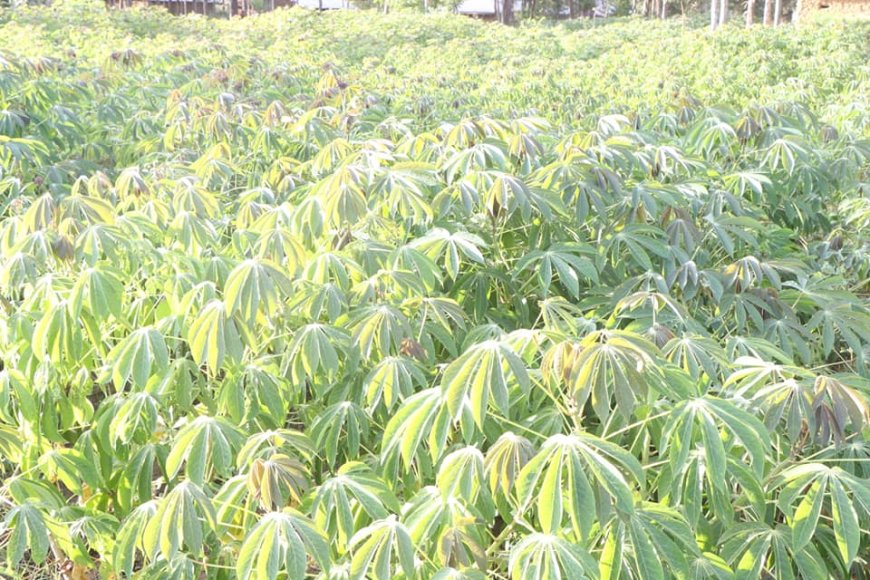Adopt cassava to save on millions used on importing wheat flour

Busia, Saturday, May 13, 2023
KNA by Absalom Namwalo
Wheat flour has become an essential and an unavoidable ingredient in the Kenyan kitchen causing high deficiency of the product as a result of increasing demand.
According to Kenya National Bureau of Statistics (KNBS) data, the country produces below 500,000 tonnes of wheat which is 40 per cent against an annual consumption of 1.2 million tonnes, making her a net importer of the commodity.
In order to curb the deficit of the wheat flour in the country, Tangakona Commercial Village is substituting wheat flour through value addition on cassava, a crop that has proven to have more benefits if properly utilized.
The CBO based in Busia County is now urging the Kenyans to use cassava flour as an alternative to wheat flour, whose price has shot through the roof due to the ongoing Russian-Ukrainian war.
Cassava being an indigenous food crop which does not require synthetic fertilizers in planting and has low gluten levels with high nutritional benefit, has become the preferred substitute of wheat from its wide range of varieties that it could be obtained from.
Growing from 56 member back then as Agro Farmers Self Help Group with aim of getting market for cassava in 2010 to now Tangakona value addition cooperative with over 3000 beneficiaries, the cooperative is now offering a solution to the high cost of living thus promoting “buy Kenya build Kenya policy”.
According to chairperson Busia Agribusiness Association Peter Kubebea, the cooperative has great potential of creating over 10,000 employment opportunity and substituting maize and wheat flour from supermarket shelves should the government partners with them to get more funding from donors.
“Busia as a county has the capacity to produce 200 tonnes of cassava annually but we only have one factory that process the same with capacity of 8 tonnes weekly due to the size of machine and dryers,” said Kubebea.
He urged Kenyans to embrace cassava as a good alternative or booster to wheat, rice and maize because it is a good source of carbohydrates.
With the production of maize and rice going down due to climate change, cassava, which is resilient to drought, offers hope amid challenging times.
“I will advise farmers in Busia to embrace cassava because it provides resilience especially in the dry season and many families can still fall back to it," he added.
The factory gets order of over 40 tonnes of cassava crisps from supermarkets across the country and now they are the leading supplier of improved cassava flour for ugali that has high nutrient content as it is blended with millet and sorghum.
“Our ugali flour is the most nutritious and unique despite being affordable as 2kg Tangakona Apmart flour cost only between Sh120 -140 depending on the supermarket,” said Kubebea.
According to the cooperative secretary Catherin Otanga, Tangakona Commercial Village is one of the organized CVs that form trading blocs for agricultural commodities. In doing this, the communities’ capacity to utilize available resources for commercial gains and to engage themselves in market-led production or processing activities has been enhanced as the Commercial Villages are strategically linked to buyers.
Through innovation and technology, cassava processing time has now reduced from 7 to 2 days thus saving time of the cooperative which targets to stamp its authority on the market by offering the best, affordable and alternative solution.
“When you move to supermarket you will notice new brand in terms of cakes, biscuits, mandazi and chapati made from cassava flour. This is the greatest milestone toward creating export of our produce to foreign markets,” said Otanga.
“Apmart Tangakona, is an enterprise that deals in value-added cassava products namely dried chips, plain flour, blended sorghum-cassava flour, blended finger millet-cassava flour and sweet potato and cassava crackles,” she added.
According to KALRO Alupe Director Dr. Moses Mudavadi, the research institution has been offering training skills, seeds and technical support to farmers growing cassava to increase the production.
“KALRO, through research brought to farmers improved varieties, among them; MH95/ 183; MM96/2840; MM96/2270; MM98/0293; Migyera; MM96/5280; MM4776, among others. Under proper agronomical practice, this variety can yield up to 20, 000Kg of cassava per acre. These new varieties have the following advantages: they are high yielding, early maturing, have low cyanide levels and good underground storability, high dry matter content and are sweet to taste,” he noted during an agriculture exhibition at Alupe.
Dr. Mudavadi added that in some markets, cassava flour is used as an ingredient for making sausages, fructose for soft drinks, biodegradable plastics, beer, and in textiles.
“The flour is also used in some pharmaceutical products, ethanol for powering vehicles and cooking stoves, among others,” he noted.
Farmers led by Alice Manyuru now want Busia county government to partner with the cooperative to expand the Apmart Tangakona factory to give Busia and the country at large a brand that stands tall in the world market.
“Cassava has become my everything - from food, school fees and now my only source of employment as a farmer and a member of the cooperative,” said Manyuru.
Courtesy; K.N.A
What's Your Reaction?



































































































































































































































































































